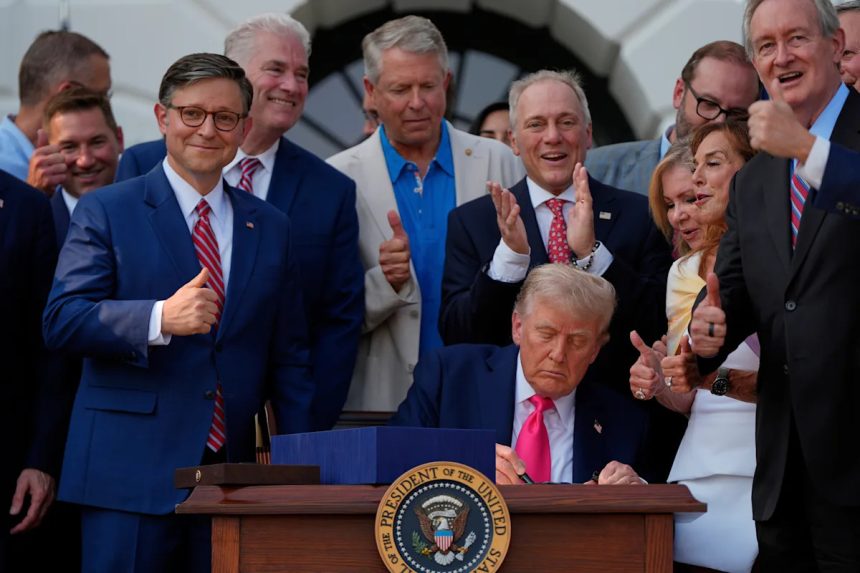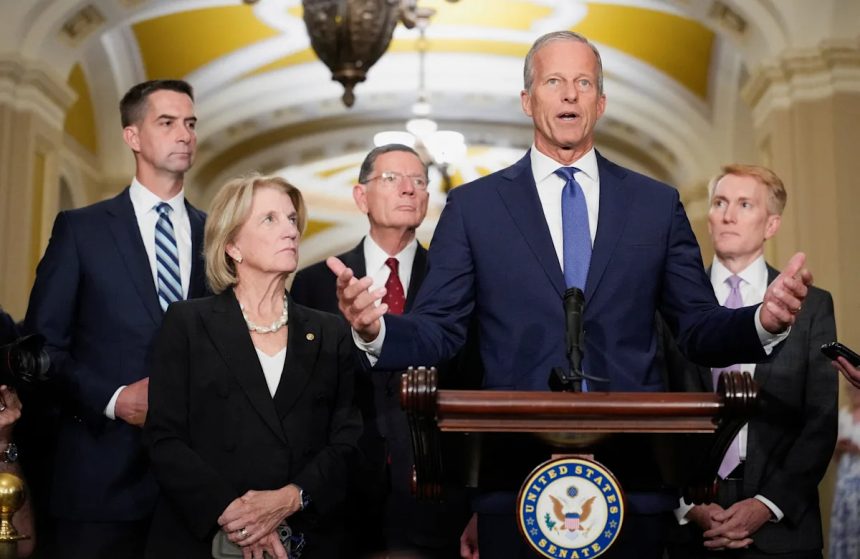President Donald Trump is acknowledging another problem with the GOP’s megabillsales pitch: The name of the legislation doesn’t describe what it does.
“I’m not going to use the term ‘great, big, beautiful,’” Trump told reporters Tuesday. “That was good for getting it approved, but it’s not good for explaining to people what it’s all about.”
His comments are the latest sign Republicans are still trying to figure out how to sell the heart of their legislative agenda to voters heading into next year’s midterm elections.
It’s also the first time the president has hinted at some regret over inspiring the name for the massive domestic policy package — which pairs an extension of Trump’s 2017 tax cuts with campaign promises like “no taxes on tips,” an overhaul of social safety net programs and new funding for the military and immigration enforcement.
Earlier this year, as congressional Republicans sparred over whether to break up codifying Trump’s policy wish list into two bills or a single piece of legislation, Trump repeatedly called on his party to just pass “one big, beautiful bill.”
GOP leaders responded by naming their package the “One Big Beautiful Bill Act,” a decision that has launched Democrats on a crusade to flood the zone with a rebrand of the “big, ugly bill.”
That includes former Democratic Rep. Abigail Spanberger, who is running for governor in Virginia and launched a new ad Tuesday against her opponent, Republican Winsome Earle-Sears, for supporting legislation that “raises health care costs, raises mortgages, raises the price of electricity and gas.”
Republicans, meanwhile, have blanketed the country over the August recess to try to sell and explain the new law to voters and counteract both the Democratic narrative against it and some early polling suggesting there’s initial disapproval. GOP lawmakers have viewed their weekslong break as a crucial period for the party to find its footing on megabill messaging, knowing it could make or break their hopes of holding on to their majorities in the House and Senate next year.
They also hope to avoid the fate of Democrats, who spent several grueling months negotiating among themselves to pass a massive climate and social spending bill in 2022 — only for most Americans to say they either never heard of it, or were swayed by the GOP’s counterargument it was a “green new scam.” Democrats also learned quickly that calling the law by its formal title, the Inflation Reduction Act, was ill-advised, with even then-President Joe Biden expressing remorse over the name.
In yet another signal Republicans are starting to realize the One Big Beautiful Bill Act isn’t resonating as a catch phrase, Sen. Katie Britt of Alabama on Tuesdayposted on social media that she was thankful that Trump signed the “Working Family Tax Cuts Bill into law,” saying it would give her state “much-needed funding, technology, and support for rural hospitals.”
Republicans’ challenge is compounded by the reality that a major hurdle in selling the megabill has nothing to do with the name but with the fact that many of its policies won’t fully go into effect until at least next year. That means voters won’t feel the immediate impact from what Republicans believe are some of the new law’s biggest benefits, while Democrats tout findings from the Congressional Budget Office showing that millions of people are on track to lose health insurance.
House Republicans have hit their districts over the recess to make their best pitches, from appearances at rural hospitals to tours of small businesses. Many of them have held town halls, where constituents have delivered fierce pushback.
“We have to do better” at selling the megabill, one House Republican said in a recent interview. “We have to pound that over and over again: Constituents are going to feel it.”












